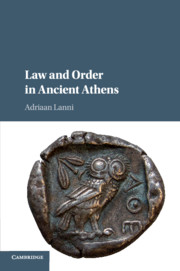Introduction: The Puzzle of Athenian Order
Published online by Cambridge University Press: 05 August 2016
Summary
This book is motivated by a puzzle. Classical Athens had only a limited formal coercive apparatus to ensure order or compliance with law. There was no professional police force or public prosecutor, and nearly every step in the legal process depended on private initiative. Moreover, Athens did not have a “rule of law” in the sense that the courts did not enforce norms expressed in statutes in a predictable and consistent manner. And yet Athens was a remarkably peaceful and well-ordered society by both ancient and contemporary standards. Why? This book draws on contemporary legal scholarship that understands “law” as the product of the complex interaction between formal and informal norms and institutions to explore how order was maintained in Athens.
Before turning to solutions, it may be helpful to examine each piece of the puzzle. First, what does it mean to say that Athens was a peaceful, well-ordered society? At the most basic level, Athens enjoyed remarkable political stability, particularly by comparison to other Greek city-states and the Roman Republic. Aside from two short-lived oligarchic revolutions near the end of the fifth century, both of which were precipitated by major military defeats, the democracy largely avoided serious civil and political violence and unrest throughout the classical period.
The level of ordinary crime and violence is harder to assess and impossible to quantify, but our evidence suggests that Athens enjoyed “relatively low rates of criminality.” Literary sources indicate that it was not unusual to walk alone or at night in both the city and the countryside without excessive fear of crime. Athenians did not ordinarily carry weapons, and the fights and violence that did occur were generally limited to the use of fists, stones, sticks, and potsherds. Despite the existence of banks for safekeeping, we hear of Athenians keeping significant amounts of money and valuables in their homes. To be sure, there is also evidence of theft, banditry, drunken brawls, and enmity erupting into violence. But the overall picture that emerges is one in which fear of crime and violence did not disrupt everyday activities.
- Type
- Chapter
- Information
- Law and Order in Ancient Athens , pp. 1 - 14Publisher: Cambridge University PressPrint publication year: 2016



